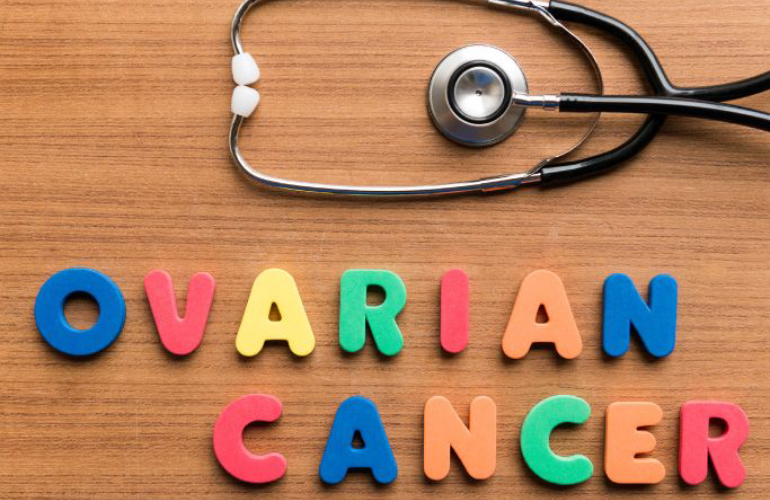Ovarian cancer is the fifth most common cancer in women and the most common cause of gynecologic cancer deaths. Approximately, one in 70 women will develop ovarian cancer in their lifetime.


Apart from being difficult to diagnose, ovarian cancer is also hereditary. In fact, 10% of ovarian cancers come from inherited genetic mutations in the BRCA1 and BRCA2 genes that are present from birth, according to the CDC. Only mutated or defective genes cause abnormal cells to grow out of control. Women with an inherited BRCA1 mutation have a 35-70% lifetime risk of ovarian cancer, while women with an inherited BRCA2 mutation have an estimated risk between 10% and 30% by age 70, according to the American Cancer Society.
Understanding your BRCA mutation status can be the first step to staying protected. Genetic testing of typically the blood or saliva can determine your BRCA mutation status and help you understand your ovarian cancer risk if you have not yet been diagnosed. Tumor testing (in which a sample of the tumor is tested for genetic mutations) can help guide treatment decisions if diagnosis is already done.
Letting your doctor know about any first or second degree relatives (on both maternal and paternal sides) who have had ovarian, breast or colorectal cancer. Read more on Can ovarian cancer be inherited? Details of the relatives age at diagnosis, the outcome, the results of any past genetic testing etc. are important. Other risk factors include:
The most common symptoms are bloating, pelvic or abdominal pain, indigestion, difficulty in eating, loss of appetite. While these symptoms need not necessarily indicate to ovarian cancer, persisting symptoms need to be discussed with your healthcare provider who will most likely suggest a pelvic ultrasound.
Genetic testing of the blood or saliva is carried out to determine if you have inherited a BRCA mutation. This can help determine next steps to reduce your risk for ovarian cancer depending on the results. In case diagnosis is already been done, your BRCA status can help inform treatment options or clinical trial eligibility. In most cases, your doctor or a genetic counselor will collect a DNA sample from your blood or saliva and have the results back within a few weeks. If you have a family history of breast or ovarian cancer then you can opt for BRCA gene mutation testing to assess your risk.
While the precise link between cancer and excess weight is unknown, an unhealthy lifestyle, poor eating habits and lack of exercise can increase your risk of developing cancer. An interplay of metabolism, inflammation and immunity creates an environment in the body that is more permissive to cancer. Studies also show that fit and active women bear a lower risk of developing ovarian cancer than those who are not. Finding the right diet, exercising and a general healthy lifestyle goes a long way.
Regular screenings are vital to catching cancer early. But screening systems are recommended for women who have a family history of cancer and when a BRCA mutation is noted. Otherwise, there are no set guidelines This is key to increasing the odds of survival. The different types of tests, processes, and infrastructure used to screen for ovarian cancer are as follows :
Treatment usually depends on the stage of cancer. While early detection is best for full recovery, treatment even in the later stages can help prevent cancer from metastasizing to other distant sites. Two primary types of curative treatments for ovarian cancer are: local treatments and systemic treatments. Surgery is the local treatment which essentially means that the tumor is treated locally without affecting other regions in the body. Among systemic treatments are chemotherapy and targeted therapy, where the drugs can reach cancer cells anywhere in the body. You might also want to try palliative care which helps with relieving symptoms of ovarian cancer.
కీమోథెరపీ కోసం క్యాన్సర్ రోగులు ఎలాంటి దుస్తులు ధరించాలో తెలుసా? ఈ ఆర్టికల్లో, క్యాన్సర్ రోగులకు కీమోథెరపీని సౌకర్యవంతంగా పొందడంలో సహాయపడే దుస్తుల జాబితాను అందించాము.
ఈ కథనం మీ క్యాన్సర్ రకానికి సరైన క్యాన్సర్ వైద్యుడిని కనుగొనడానికి 6-దశల గైడ్ను వివరిస్తుంది.
तंबाकू का सेवन गुटका, जर्दा, पैन मसाला आदि के रूप में करना सिर और गले के कैंसर का मुख्य कारण…
నోటి పుండ్లతో బాధపడుతున్న క్యాన్సర్ రోగులకు క్యాన్సర్ చికిత్సలో ఉన్నప్పుడు తీసుకోవాల్సిన 12 ఉత్తమ ఆహారాలు.
క్యాన్సర్కు కారణమయ్యే 6 జీవనశైలి కారకాలు గురించి ఈ కథనంలో వివరంగా ఇవ్వబడ్డాయి. అవి ఏమిటో తెలుసుకోండి!
शोध की मानें तो न्यूज़पेपर प्रिंट करने में जो स्याही का इस्तेमाल होता है उसमें ऐसे केमिकल होते हैं जो…